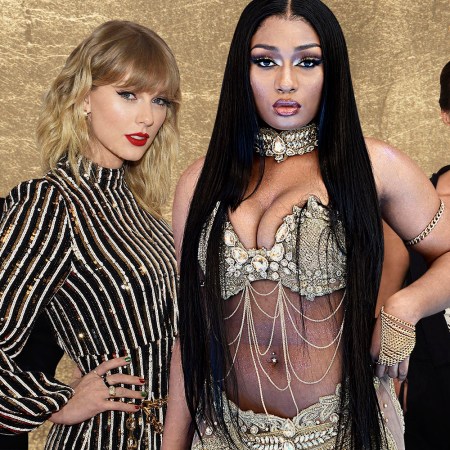This is Hear Us Out, a column charting the storylines and releases that mattered — to us, and hopefully you — in the world of music over the past month.
Maybe it’s just me, but as we head into our fifth month of quarantine, I’m beginning to feel like a raw nerve. Every emotion is amplified; a simple socially distanced beer with a friend is suddenly the most joyful, incredible thing I’ve experienced in weeks, while every setback feels like another straw on the proverbial camel’s back — proof that the world is surely about to end at any second.
Those high highs and low lows could be felt in the music industry this month as well. We received many welcome distractions to latch onto (New Taylor Swift! New Beyoncé! A stunning new Angel Olsen track!), but we were also forced to grapple with a new crop of disturbing allegations of sexual abuse and misconduct in the indie-rock world.
With that in mind, these are the biggest storylines and most notable releases from the past month.
Taylor Swift Goes “Indie”
Taylor Swift shocked fans last week when she announced with no warning that she’d be releasing her eighth studio album, folklore, at midnight on July 23. But even more surprising than the fact that it is possible to be productive in quarantine (Swift wrote and recorded the entire album during the pandemic) was the news that the pop star had collaborated with indie-rock stalwarts Bon Iver and The National’s Aaron Dessner. Dessner co-wrote or produced 11 of folklore‘s 16 tracks, and his influence can definitely be heard throughout the record. It’s a big sonic shift for Swift, and the reception it has received thus far has sparked another round of debate over “poptimism” and what it takes for old indie dudes who previously dismissed her to respect Swift’s songwriting.
It also raised questions over artists’ relationship to criticism, after Swift stans harassed and doxxed Pitchfork senior editor Jillian Mapes — calling her home, posting her address and other information online, threatening to harm her and burn down her house — in response to Mapes’s positive review, which gave the album an 8.0 out of 10. (Apparently anything less than a perfect 10 is an insult?) As the Daily Beast points out, “In this context, Swift’s continued silence essentially becomes tacit permission for her fans to continue harassing anyone they please. It’s perhaps not the best look for a pop star who once had a hit all about overcoming bullying — and who last year wrote about fearing for her safety after her personal information was repeatedly shared online.”
Also a big proponent of the surprise album drop, Beyoncé unleashed her new visual album Black Is King exclusively on Disney Plus late last night. The project is inspired by her music for the remake of The Lion King, where she appeared as the voice of Nala, and it features some stunning visuals. You can check out the video for “ALREADY” below.
Indie Rock Has An Abuse Problem
Sexual abuse and misconduct are sadly prevalent in every sector of society, and July served as a bitter reminder that includes some of our most beloved scenes. This month, the garage and indie rock worlds were shaken up by a slew of allegations. The floodgates were opened when an Instagram account called “Lured by Burger Records” began chronicling allegations of abuse by artists and others affiliated with the California-based record label. The sheer number of bands involved as well as the deeply upsetting nature of some of the claims (which range from rape to “grooming” of underage fans) was proof of a widespread problem, and Burger Records at first announced it was rebranding as BRGR RCRDS (because I guess addressing years of rampant toxic masculinity is as simple as ditching a few vowels?) and launching a female-centric imprint called BRGRRL (yes, seriously). When that decision was met with an appropriate level of backlash, the label reconsidered and announced on July 22 that it was folding entirely.
After allegations against him surfaced on the Lured By Burger Records account (including one anonymous post from a former fan who claimed he had masturbated while Skyping with her when she was just 14 and he was in his late 30s), Nobunny (real name Justin Champlin) admitted to a history of sexual misconduct and announced he was permanently quitting music in a lengthy statement. “I fucked up bad,” it read in part. “I used my power and influence to take advantage of young women and teenage girls. Everything I have ever done was consensual and seemingly enjoyed by both parties, but with age, gender, and power dynamics, I realize that consent isn’t always there if the power dynamic is off.”
The abuse allegations extended beyond Burger Records, though. After he admitted in a since-deleted Instagram post that he had been “completely inappropriate to women,” Merge Records cut all ties with Ian Svenonius (of The Make-Up, Nation of Ulysses, Chain and the Gang and other acts).
“We are pulling his catalog from our webstore, physical distributors, and streaming/download services,” the label wrote in a statement. “The information and allegations surrounding Ian’s post last Friday have been illuminating and disheartening. We see and stand with all those who have come forward and all those who haven’t, and we will continue working and listening to do our part in making the music community one that is safer and more inclusive for everyone.”
Avi Buffalo’s music was also pulled from stores and digital services by Sub Pop after Avi Zahner-Isenberg was accused of rape by former bandmate Rebecca Coleman. “After hearing about a rape accusation that was shared yesterday, Sub Pop is in the process of removing all Avi Buffalo music from our stores and digital services,” the Seattle label said in a statement. “We do not accept sexual abuse and assault towards anybody and we commend anyone who is able to muster up the strength to speak out and share their experiences; that’s not easy. We believe and support Rebecca and hope that she is able to cope and heal.”
The Regrettes’ Lydia Night was moved to go public with her accusations of emotional abuse and sexual coercion against SWMRS drummer (and son of Green Day’s Billie Joe) Joey Armstrong after his band’s “delusional positioning of themselves as woke feminists” in an Instagram post reacting to the Burger Records abuse. Night revealed she was involved in a relationship with Armstrong when he was 22 and she was just 16. If anything, the allegations served as a sobering reminder that an artist’s public-facing persona doesn’t always match their behavior behind closed doors.
Save Our Stages
As the pandemic rages on, the number of independent music venues forced to permanently close their doors continues to grow. But it’s possible that government relief could finally be on the way in the form of the Save Our Stages act, a bill introduced in Congress earlier this month by Senator Amy Klobuchar of Minnesota and Senator John Cornyn of Texas.
If passed, the bill would provide independent venues with six months of financial support to “keep venues afloat, pay employees and preserve a critical economic sector for communities across America.” The grant amounts would be the lesser of either 45 percent of the business’s operation costs from last year or $12 million.
“While existing government assistance programs have helped other industries, they weren’t tailored to meet the needs of small businesses like ours that have zero revenue, enormous overhead and no visibility into when we can fully re-open,” Adam Hartke, the co-chair of the National Independent Venue Association’s advocacy committee, said in a statement. “The Save Our Stages Act will provide the assistance we need to get through the shutdown until we can reopen safely and once again become the economic generators for our communities that we’ve always been.”
You can contact your local representatives and urge them to support the Save Our Stages bill using the template here.
Recommended Reads
This month at InsideHook, we caught up with Talking Heads drummer Chris Frantz, explored the connection between jazz and hip-hop, reflected on the 35th anniversary of Live Aid and examined ill-advised comeback attempts by Ryan Adams and PWR BTTM’s Ben Hopkins. As always, you can check out all of our music coverage here.
But beyond our own work, there were plenty of excellent music-related reads this month, including Bootsy Collins’s recollections of James Brown’s “Sex Machine” for Rolling Stone in honor of the track’s 50th anniversary, the New York Times‘ oral history of Almost Famous’s famous “I am a golden god” scene, and Billboard‘s look at why rock radio refuses to embrace Harry Styles.
Key Album Releases
Dehd, Flower of Devotion
Chicago indie-rock trio Dehd returns with their biggest, best album yet — full of reverb, yelps, and unique phrasings. Singer/bassist Emily Kempf’s voice steals the show on tracks like “Letter” (the way she stretches “baby” into “bay-ey-ey-BAY” there will stay with you) and the infectious “No Time,” but guitarist Jason Balla and drummer Eric McGrady both continue to pull their weight as well, and McGrady steps up to the mic for the first time on “Apart.” Flower of Devotion is Dehd’s finest work to date, and yet it leaves us with the sense that even bigger things are on the horizon.
Margo Price, That’s How Rumors Get Started
You probably know Margo Price primarily as a country singer — and a great one at that — but on That’s How Rumors Get Started, she leans hard into her classic-rock influences for a bit of a departure. You can hear the influence of Neil Young, Fleetwood Mac and Tom Petty, and in fact former Heartbreaker Benmont Tench appears on the record. Co-produced by Sturgill Simpson, the album was originally slated to be released on May 8, but was pushed back to mid-July due to the pandemic. Now that it’s finally here, we couldn’t be happier.
Fontaines D.C., A Hero’s Death
Debut album Dogrel earned Irish post-punk band Fontaines D.C. critical acclaim and a 2019 Mercury Prize nomination, and while their follow-up A Hero’s Death (out today via Partisan Records) still features the same poetic lyricism from frontman Grian Chatten, it also sees the band grappling with its newfound success and shifting in a new musical direction. On opening track “I Don’t Belong,” the message is loud and clear: “I don’t belong to anyone/I don’t want to belong to anyone.”
Songs You Need to Hear
Angel Olsen drops the title track from her new album due out at the end of August; Sufjan Stevens crams all 50 states into a single song on “America’; The Rolling Stones unleash the previously unreleased “Scarlet,” a 1974 collaboration with Jimmy Page, for their Goats Head Soup reissue; John K. Samson releases the extremely timely “Fantasy Baseball at the End of the World”; Matt Berninger, Bill Callahan and Fuzz give us fresh tastes of their forthcoming records; Lee Fields covers Sunny & The Sunliners for a new tribute album; Gorillaz team up with Schoolboy Q; and Bob Mould predicts rain.
You can listen to all those and more in the playlist below.
This article appeared in an InsideHook newsletter. Sign up for free to get more on travel, wellness, style, drinking, and culture.

























